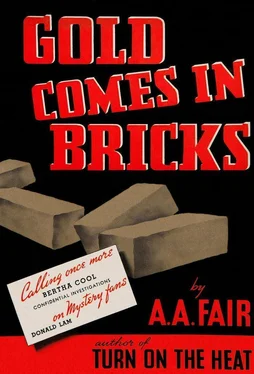I pushed open the door.
A rather good-looking girl sat over at Elsie Brand’s desk with her arms wrapped around the typewriter, digging away at the paper with a circular rubber eraser.
She looked up with a perfectly blank face.
I jerked my thumb toward the inner office. “Anybody in there?”
“Yes.” She reached for the telephone.
I said, “Never mind. I’ll wait.”
“Won’t you give me your name?”
“It isn’t necessary.”
I walked over to the corner, sat down, and picked up a newspaper. I turned to the sporting section and lit a cigarette as I settled down to reading.
The girl finished her erasure and started at the keyboard again. From time to time she’d look at me. I didn’t look up to meet her eyes, but didn’t need to. She had a habit of stopping the typing whenever she looked across at me.
I could hear voices in Bertha Cool’s office, just a few stray bits of conversation without being able to distinguish words.
After a while the door opened, and a man came out. I had the paper up in front of my face at the time, but I could look under the edges of the paper and see his legs from the knees down, and his feet.
There’s an old exploded theory that detectives wear big square-toed shoes. At one time they may have done it, but the good detectives quit it long before the public ever knew anything about it.
This man had lightweight tan shoes and well-creased trousers, but there was something about the way he handled his feet that made me keep the paper up. He started to walk out, then suddenly paused, turning around, and said something to Bertha Cool. The toes of his shoes were pointing directly at me. I held the paper up, and he kept on standing there.
I put down the paper, looking up with a blank look, and said, “Mrs. Cool?”
She took a quick breath.
The man was about forty-five, tall, and fairly broad across the shoulders. He seemed a quiet, reserved chap, but there was something in his eyes I didn’t like, although I didn’t look at them.
Bertha said, “What do you want? Don’t tell me you’re selling anything. I’ve subscribed to all the magazines and made all the donations I’m going to.”
I smiled and said, “Whenever you’re at liberty,” and returned to my paper.
The man said, “Good morning, Mrs. Cool,” and walked across the office. Bertha Cool stood there until the outer office door had clicked shut, then she jerked her thumb, motioning me into the office.
I followed her in and closed the door. She lit a cigarette. Her hand was trembling. “My God, Donald,” she said, “how did you know?”
“What?”
“That he was a detective looking for you?”
“Something in the way his shoes were pointed toward me,” I said. “He acted like a bird dog.”
“Well, God knows it was a lucky hunch,” she said, “but it isn’t going to do you any good.”
“What does he want me for?”
“You should know.”
“What did he say?”
“Said that he was making a routine check-up on some people he wanted to interview in connection with that murder. He wanted to know if I had a man working for me named Lam, and asked if he was doing some work for a Mr. Ashbury.”
“What did you tell him?”
“I told him that I wasn’t at liberty to make any statements about what my employees were doing. That was up to Mr. Ashbury.”
“They’re wise,” I said. “They’re after Alta on another matter, and they’ve found out I’m out at the place.”
She said, “They’ve found out you answer the description of the man they want in connection with that Ringold murder.”
“Probably.”
“Well, what are we going to do?”
I said, “I’m going to duck out for a while.”
“Are you making any headway on the case?”
“Some.”
She said, “Donald, you get me into more damn trouble. During the time you’ve been with me I’ve got in hot water on every case I’ve tackled.”
“You’re making ten times as much money, too,” I pointed out.
“Well, what of it? You’re too wild. You take too many chances. Money isn’t any good in jail.”
“Is it my fault that a man chooses the particular moment I’m working on a case to bump someone off?”
She couldn’t think of any answer to that so didn’t make any. She looked at me with hard, glittering eyes and said, “I telephoned Elsie to find out how the work was getting on, and she said you’d told her to stop it.”
“That’s right.”
Her face flushed. “I’m running this office.”
“And I’m running Fischler’s office. What’s the use of going to all the trouble making a plant if a man comes in the door and sees a secretary writing letters on the stationery of B. Cool — Confidential Investigations?”
“Well, I can’t have her sitting over there twiddling her thumbs, doing nothing. I’m paying her a salary. I have work that has to go out.”
“Get another girl,” I said, “and charge it to expenses.”
“Expenses nothing. I’m not going to trade with you. You take this girl over there, and I’ll have Elsie come back here.”
“Okay, if you say so.”
“Well, I say so.”
“You’re the boss.”
She waited for me to argue, and I didn’t argue.
“Well, what’s wrong with it?” she demanded.
“Nothing, if you want it done that way. Of course, the way things are shaping up now, it might make it a little involved if this girl should go home and talk to her mother, or her boy friend about how she’d been switched.”
“I’ll fire her and get another. This one’s no good anyway.”
I said, “All right, be sure you get one who doesn’t have a sweetheart or a family.”
“Why?”
“Because girls talk when they go home. That office over there in the Commons Building— Well, you know how it is. I can’t turn out any work. It’s just a plant. A girl with any sense would know it’s a plant.”
Bertha took a deep drag at her cigarette. “Well, things can’t go on this way.”
“That’s right.”
“Donald, they’re going to get you. They’ll drag you over to that hotel. The people will identify you, and you’ll be in jail — and don’t think your salary goes on while you’re in jail.”
I said, “I’m going to spend a thousand dollars of expense money this afternoon.”
“A thousand dollars!”
“That’s right.”
Bertha Cool tried the cash drawer to make sure it was locked. It was. “Well, you’ve got another think coming,” she snapped.
I said, “I’ve spent it already.”
“You’ve done what?”
“Spent it already.”
She blinked her eyelids once, then stared steadily. “Where’d you get it?”
“Ashbury.”
“So you went to him direct after getting all that money from me.”
“No. He came to me.”
“How much did you get?”
I waved my hand in an airy gesture. “There’s no limit. He told me whenever I needed a few thousand to call on him.”
She said, “I’m making the business arrangements for this agency.”
“Go ahead and make them, only see that my style isn’t cramped.”
She leaned over and toward me, getting as close to her desk as her figure would permit. “Donald,” she said, “you take in too damn much territory. I’m running this business.”
“No question about that.”
“Well, when I—”
There were hurried steps across the office. I could hear the bleat of the new substitute secretary as she tried to stem the human avalanche which dashed across the office and wrestled with the doorknob. The door jerked open, and Henry Ashbury came puffing in. “There you are,” he said to me. “What were you trying to do, give me heart failure?”
Читать дальше












